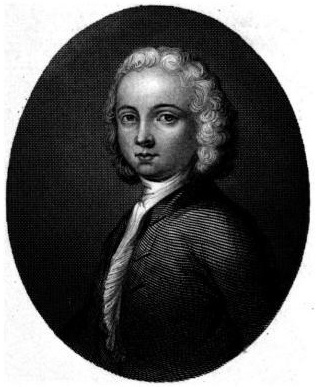William Collins cytaty
William Collins: Cytaty po angielsku
“Too nicely Jonson knew the critic's part;
Nature in him was almost lost in Art.”
To Sir Thomas Hammer on his Edition of Shakespeare.
Źródło: The Passions, an Ode for Music (1747), Line 57. Compare: "Sweetest melodies / Are those that are by distance made more sweet", William Wordsworth, Personal Talk, stanza 2.
“When Music, heavenly maid, was young,
While yet in early Greece she sung.”
Źródło: The Passions, an Ode for Music (1747), Line 1.
Samuel Johnson The Lives of the Most Eminent English Poets (1781), "William Collins" http://www.bookrags.com/ebooks/4678/50.html
Criticism
“O Music! sphere-descended maid,
Friend of Pleasure, Wisdom's aid!”
Źródło: The Passions, an Ode for Music (1747), Line 95.
Źródło: Ode to Evening (1747) http://www.netpoets.com/classic/poems/017002.htm, line 9.
“Well may your hearts believe the truths I tell:
'T is virtue makes the bliss, where'er we dwell.”
Oriental Eclogues. 1, Line 5. Compare: "That virtue only makes our bliss below, / And all our knowledge is ourselves to know", Alexander Pope, Essay on Man, Epistle iv, line 397.
“By fairy hands their knell is rung,
By forms unseen their dirge is sung.”
Źródło: How Sleep the Brave (1748), line 7.
“How sleep the brave, who sink to rest,
By all their country’s wishes blest!”
Wariant: How sleep the brave who sink to rest
By all their country's wishes blest!
Źródło: How Sleep the Brave (1748), line 1.
Źródło: Ode Occasioned by the Death of Mr. Thomson, (1748) http://www.luminarium.org/eightlit/collins/thomson.php, line 1.
Źródło: Ode to Evening (1747) http://www.netpoets.com/classic/poems/017002.htm, line 21.
Ode written in the year 1746. A variation of the first two lines is "By hands unseen the knell is rung; / By fairy forms their dirge is sung".
“Love of peace, and lonely musing,
In hollow murmurs died away.”
Źródło: The Passions, an Ode for Music (1747), Line 67.
Źródło: Ode Occasioned by the Death of Mr. Thomson, (1748) http://www.luminarium.org/eightlit/collins/thomson.php, line 29.
